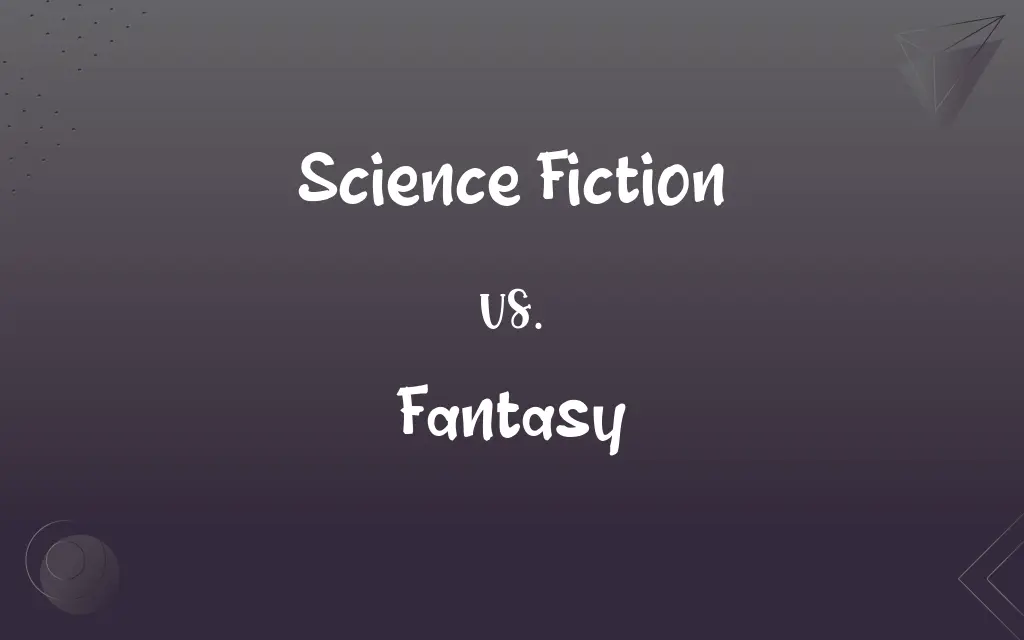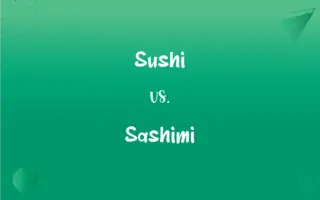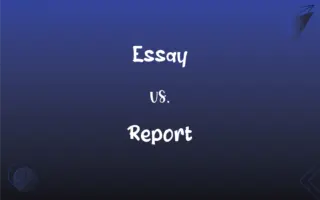Science Fiction vs. Fantasy: What's the Difference?
Edited by Aimie Carlson || By Harlon Moss || Updated on October 19, 2023
Science fiction explores speculative future events or technology, while fantasy involves magical or supernatural elements.

Key Differences
Science fiction and fantasy both fall under speculative fiction, offering readers and viewers an escape from reality. Science fiction, often abbreviated as sci-fi, delves into the realms of future events, advanced technology, and space exploration. Fantasy, on the other hand, ventures into magical worlds, mythical creatures, and supernatural events.
At its core, science fiction attempts to be somewhat plausible, often rooted in existing or projected scientific principles. In contrast, fantasy often operates on its own set of internal rules, with magic and myth taking precedence over the laws of nature and science.
It's not uncommon to find overlap between science fiction and fantasy. However, distinguishing them becomes easier when focusing on their foundational elements. Science fiction is driven by the "what ifs" of scientific advancements, while fantasy is shaped by myths, legends, and the imagination.
Themes in science fiction frequently revolve around humanity's place in the universe, consequences of technological advancements, and moral dilemmas. Fantasy, conversely, often centers on epic battles between good and evil, quests, and the struggle of individuals to find their destiny in a world filled with magic.
Many a time, readers and viewers may have a preference for one over the other. Some are drawn to the technological and extraterrestrial wonders of science fiction, while others find solace in the magical realms and heroic tales of fantasy.
ADVERTISEMENT
Comparison Chart
Primary Elements
Future events, advanced technology, space.
Magic, mythical creatures, supernatural realms.
Plausibility
Often rooted in science or projected scientific principles.
Operates on its own internal rules; often not plausible
Common Themes
Humanity's place in the universe, technological consequences, moral dilemmas
Epic battles, quests, destiny in a magical world.
Influences
Scientific advancements, "what ifs", extraterrestrial life.
Myths, legends, folklore.
Setting
Future Earth, other planets, spaceships.
Magical realms, mythical lands, kingdoms.
ADVERTISEMENT
Science Fiction and Fantasy Definitions
Science Fiction
A genre exploring the implications of future events or technology.
Isaac Asimov's works are staples in the science fiction genre.
Fantasy
A genre involving magical elements, often in mythical settings.
J.R.R. Tolkien's The Lord of the Rings is a monumental work of fantasy.
Science Fiction
A genre posing questions about humanity amidst technological evolution.
Blade Runner is a science fiction film that ponders what it means to be human.
Fantasy
Stories set in worlds where magic is a daily reality.
The Chronicles of Narnia transport readers to a fantasy realm with talking animals.
Science Fiction
Fiction rooted in scientific principles or advancements.
A Space Odyssey is a classic of science fiction.
Fantasy
Fiction where supernatural events or creatures drive the narrative.
Harry Potter's world is one of magic and wonder, typical of fantasy.
Science Fiction
Stories speculating about future civilizations and space exploration.
Star Trek is a renowned science fiction series about space exploration.
Fantasy
Narratives centered around myths, legends, and magical quests.
The tales of King Arthur and his knights are rooted in fantasy.
Science Fiction
Fiction exploring the boundaries of what's possible in the future.
Philip K. Dick's Do Androids Dream of Electric Sheep? raises ethical questions in a science fiction setting.
Fantasy
A genre where imagination and the impossible reign supreme.
In the fantasy novel A Song of Ice and Fire, dragons and sorcery play pivotal roles.
Fantasy
The creative imagination; unrestrained fancy.
FAQs
Does science fiction always predict the future accurately?
No, it speculates on possible futures based on current knowledge.
What is the main element in science fiction?
Speculative future events or advanced technology.
How is fantasy primarily characterized?
By magical or supernatural elements.
Why is science fiction sometimes called "speculative fiction"?
Because it speculates on potential future scenarios or technological advancements.
Can science fiction and fantasy overlap?
Yes, there are many works that blend elements of both genres.
Do all science fiction works involve space?
No, but space is a common setting or theme in the genre.
What's a renowned science fiction novel about artificial intelligence?
Isaac Asimov's "I, Robot" is a classic in this realm.
Are fairy tales considered fantasy?
Yes, they often involve magical creatures and events.
How do authors in science fiction address ethical dilemmas?
Through hypothetical situations that challenge societal norms and values.
Are myths and legends considered fantasy?
Yes, they often serve as foundational elements of fantasy.
Can science fiction influence real-world technology?
Absolutely, many technological advancements were inspired by sci-fi concepts.
What's a key difference between science fiction and fantasy in terms of setting?
Science fiction often has settings in the future or space, while fantasy is set in magical realms.
Do all fantasy stories involve magic?
While not all, the majority involve some form of magic or supernatural element.
In fantasy, can magic solve everything?
Not necessarily; many stories highlight the limits or costs of using magic.
Is every story with a dragon or a witch a fantasy?
Typically, but context matters; sometimes they can appear in allegorical tales or other genres.
Which fantasy series involves a magical school for wizards?
"Harry Potter" by J.K. Rowling.
Is "Dystopian" a subgenre of science fiction?
Yes, it explores bleak futures often resulting from societal or technological extremes.
Are superheroes part of science fiction or fantasy?
They can be both, depending on the narrative. Some superheroes have scientific origins, while others possess magical powers.
Can a work of literature be both science fiction and fantasy simultaneously?
Yes, some works blend elements from both genres, creating a hybrid narrative.
Can fantasy worlds have their own rules of science and physics?
Yes, fantasy worlds often operate by their own unique rules.
About Author
Written by
Harlon MossHarlon is a seasoned quality moderator and accomplished content writer for Difference Wiki. An alumnus of the prestigious University of California, he earned his degree in Computer Science. Leveraging his academic background, Harlon brings a meticulous and informed perspective to his work, ensuring content accuracy and excellence.
Edited by
Aimie CarlsonAimie Carlson, holding a master's degree in English literature, is a fervent English language enthusiast. She lends her writing talents to Difference Wiki, a prominent website that specializes in comparisons, offering readers insightful analyses that both captivate and inform.































































